Your First Step Towards Financial Fitness: Meeting with a Financial Advisor
The hardest part about getting in shape is often just getting to the gym. The same can be said of your financial well-being – the hardest part is often just making that first appointment with a financial advisor. But why is that? Why is it so difficult to take that first step toward financial fitness? There are a few reasons.
Shifting Your View of Money
First, many of us have a negative view of money and finances. We think of it as something stressful and complex, something that we just don’t understand. A good financial advisor will have your best interests at heart and will work with you to build a plan that meets your specific needs.
They will help you understand what is working well and where improvements can be made. If you want assistance in making those changes, they will help guide you through the process so that you can achieve your goals. By helping people understand their investments, they will learn where those investments are going and how it impacts them. Ideally, the plan is easy to follow so that anyone can understand it.
The goal is to help you feel more confident and in control of your finances so that you can make sound decisions about your money. Just like getting in shape requires commitment and effort, financial fitness is a journey that takes time. But it all starts with that first appointment.
What to Expect at Your First Meeting
Second, we may not know what to expect from a first appointment with a financial advisor. The first step is getting a clear picture of your current financial situation. This includes looking at your income, debts, expenses, and investment portfolio. An advisor can help you identify any areas where you may be able to save money or make changes to improve your overall financial health.

It’s important to come prepared. Your financial advisor will need some essential information from you, such as your current income and expenditures, investment statements, tax returns, and financial goals, to create a tailored plan that fits your needs. Having all this information ready ahead of time can help make the appointment go smoother and allow you to get the most out of it.
Once your financial advisor has a thorough understanding of your situation, they can begin developing an action plan to help you reach your goals and set you up for financial fitness down the road. With their assistance and guidance, you’ll be able to make educated choices about your money and investments.
Planning for Future Income
It’s also important to have an income analysis to understand where your money will come from once you retire (or even just in the future). If you’re retired already, where is your current income coming from? And if you’re planning on retiring soon, when your paycheck stops, what sources of income do you have lined up?
Although pensions or Social Security are almost guaranteed, what about other retirement accounts, such as IRAs or 401(k)s? When is the best time to withdraw from these accounts? What plan should you follow to get the optimal results for yourself and your loved ones? These are all questions a professional will help you find the answers to.
Understanding Your Investment Risk
It’s important to know where your investments are and how much risk you are taking. Most people have some exposure to the market to keep up with inflation and maintain their standard of living. An advisor will review your risk tolerance and adjust it accordingly. Depending on your age and retirement goals, you may need to adjust the amount of risk you’re taking.
Facing Your Financial Reality
And lastly, we may be afraid of what we’ll find out – that we’re not as financially healthy as we thought we were. At Johnson Brunetti, we meet with people from various backgrounds and levels of preparedness for retirement on a regular basis.
Even if someone hasn’t saved much for retirement, that’s okay! We can often help them by assessing their current situation and advising them on what they need to do going forward to reach their goals. A good advisor will review your plan with you on a regular basis and make changes as needed. They can help you stay on track by providing support and accountability.
Choosing the Right Financial Advisor
The most important quality you should look for when finding a financial advisor is trust. Your relationship with your advisor should provide you with confidence and peace of mind surrounding matters with money. They should listen to you, understand what’s important to you, and answer your questions. You’ll want to make sure that they focus on your total financial well-being, which includes planning for after death and discussing tax burdens.
So if you’re feeling like it’s time to get your financial fitness in check, don’t let anything stop you from making that first appointment. Investing in yourself could be the most rewarding decision you ever make for your financial future. Your financial advisor can help you get on track and achieve your financial fitness goals and, like getting in shape, the sooner you start, the better.
Information presented in our podcasts is considered current as of the created date. Over time, some information presented may become stale. We recommend you consult with your Financial Professional before making any changes based on information contained here.
Johnson Brunetti is a marketing name for the businesses of JB Capital and JN Financial.
Investment Advisory Services offered through JB Capital, LLC. Insurance Products offered through JN Financial, LLC.
The guarantees provided by any type of insurance contract are based on the claims-paying ability of the insurance company.

Related Resources
-
Should I Downsize My Home for Retirement?
Equity is on the minds of many pre-retirees and retirees today, more specifically: Should I downsize my home in retirement? And if so, when is the right time to do it? In this week’s Money Wisd… -
Podcast Episode 410: 2 Key Questions to Ask a Retirement Planner
Prefer to watch? Click here to watch and listen on YouTube. Meeting with a financial planner often sparks some of the most important questions. When it comes to retirement, there’s a lot to con… -
How Can You Protect Your Retirement Assets for Your Family?
When you’re focused on planning for retirement, it’s easy to overlook how you can protect your assets for both yourself and your family. While there’s no one-size-fits-all approach, your first ste… -
Podcast Episode 409: Which Retirement Accounts Should I Withdraw from First?
Prefer to watch? Click here to watch and listen on YouTube. Planning for retirement doesn’t end when you stop working. In fact, one of the most important financial decisions you’ll face in reti… -
How to Jumpstart Your Retirement Planning
Retirement planning can feel overwhelming, especially after decades of hard work and diligent saving. With so much to consider, how can you ensure your money lasts as long as you do? The good news… -
What Level of Risk Is Right for Your Retirement Plan?
In this week’s Money Wisdom Question Series, Ian Fergusson, RICP® addresses a fundamental concern for anyone approaching or in retirement: What level of risk is appropriate for my retirement plan?… -
Podcast Episode 408: What to Do in a Down Market
Prefer to watch? Click here to watch and listen on YouTube. As recent market fluctuations have stirred up a lot of economic uncertainty, there’s a particular question on many investors’ minds: … -
Case Study: What Should My Investment Portfolio Include?
As you approach retirement, your investment strategy must shift from aggressive growth to a focus on income generation, asset preservation, and moderate growth to outpace inflation. Consider th… -
How Can I Protect My Retirement Savings from Market Volatility?
We’ve been receiving a lot of questions lately about how to best protect your retirement savings against stock market volatility. It’s easy to let recent fluctuations in the market shake your conf… -
Avoiding the Retirement Tax Trap
Once you retire, understanding your tax implications becomes even more crucial. After all, taxes don’t disappear in retirement. In fact, as you begin withdrawing from your retirement savings, you …
